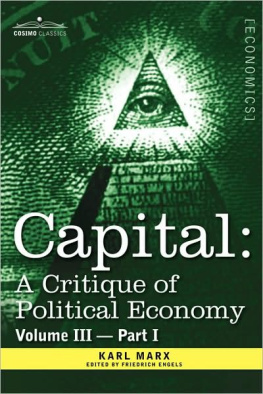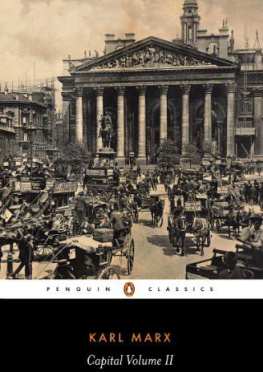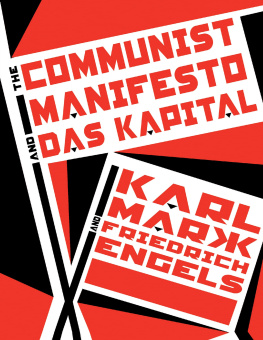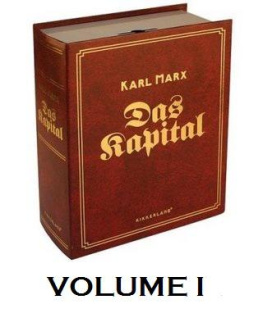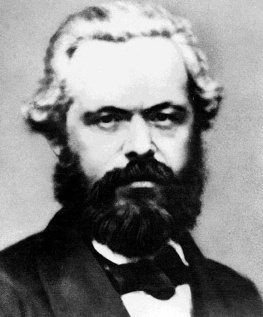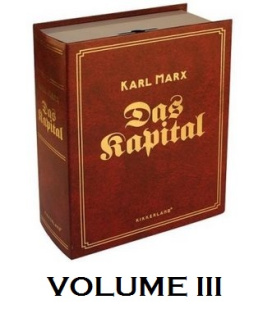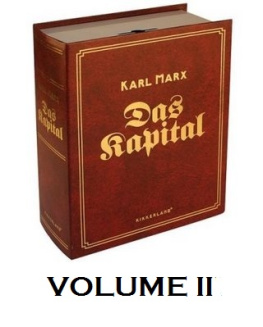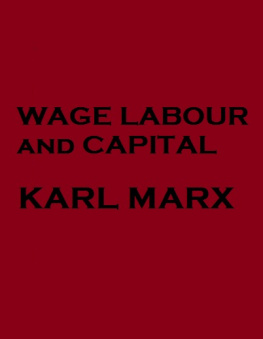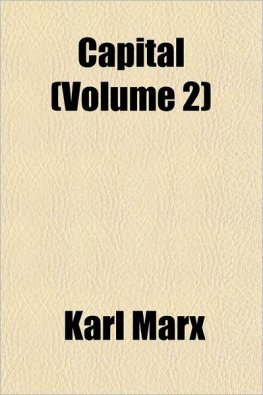Karl Marx - Capital, Vol. 3
Here you can read online Karl Marx - Capital, Vol. 3 full text of the book (entire story) in english for free. Download pdf and epub, get meaning, cover and reviews about this ebook. year: 1992, publisher: Penguin Books, genre: Politics. Description of the work, (preface) as well as reviews are available. Best literature library LitArk.com created for fans of good reading and offers a wide selection of genres:
Romance novel
Science fiction
Adventure
Detective
Science
History
Home and family
Prose
Art
Politics
Computer
Non-fiction
Religion
Business
Children
Humor
Choose a favorite category and find really read worthwhile books. Enjoy immersion in the world of imagination, feel the emotions of the characters or learn something new for yourself, make an fascinating discovery.
Capital, Vol. 3: summary, description and annotation
We offer to read an annotation, description, summary or preface (depends on what the author of the book "Capital, Vol. 3" wrote himself). If you haven't found the necessary information about the book — write in the comments, we will try to find it.
Capital, Vol. 3 — read online for free the complete book (whole text) full work
Below is the text of the book, divided by pages. System saving the place of the last page read, allows you to conveniently read the book "Capital, Vol. 3" online for free, without having to search again every time where you left off. Put a bookmark, and you can go to the page where you finished reading at any time.
Font size:
Interval:
Bookmark:

CAPITAL
VOLUME 3
KARL MARX was born at Trier in 1818 of a German-Jewish family converted to Christianity. As a student in Bonn and Berlin he was influenced by Hegels dialectic, but he later reacted against idealist philosophy and began to develop his theory of historical materialism. He related the state of society to its economic foundations and mode of production, and recommended armed revolution on the part of the proletariat. In Paris in 1844 Marx met Friedrich Engels, with whom he formed a life-long partnership. Together they prepared the Manifesto of the Communist Party (1848) as a statement of the Communist Leagues policy. In 1848 Marx returned to Germany and took an active part in the unsuccessful democratic revolution. The following year he arrived in England as a refugee and lived in London until his death in 1883. Helped financially by Engels, Marx and his family nevertheless lived in great poverty. After years of research (mostly carried out in the British Museum), he published in 1867 the first volume of his great work, Capital. From 1864 to 1872 Marx played a leading role in the International Working Mens Association, and his last years saw the development of the first mass workers parties founded on avowedly Marxist principles. Besides the two posthumous volumes of Capital compiled by Engels, Karl Marxs other writings include The German Ideology, The Poverty of Philosophy, The 18th Brumaire of Louis Bonaparte, The Civil War in France, A Contribution to the Critique of Political Economy, Grundrisse: Foundations of the Critique of Political Economy and Theories of Surplus-Value.
ERNEST MANDEL was born in 1923. He was educated at the Free University of Brussels, where he was later Professor for many years, and the cole Pratique des Hautes tudes in Paris. He gained his PhD from the Free University of Berlin. He was a Member of the Economic Studies Commission of FGTB (Belgian TUC) from 1954 to 1963 and was chosen for the annual Alfred Marshall Lectures by Cambridge University in 1978. His many books include The Formation of the Economic Thought of Karl Marx, Late Capitalism, The Long Waves of Capitalist Development, The Second Slump and The Marxist Theory of Bureaucracy. His influential pamphlet, An Introduction to Marxist Economics, sold over half a million copies and was translated into thirty languages. Ernest Mandel died in July 1995. In its obituary the Guardian described him as one of the most creative and independent-minded revolutionary Marxist thinkers of the post-war world.
KARL MARX
A Critique of
Political Economy
Volume Three
Introduced by
Ernest Mandel
Translated by
David Fernbach
Penguin Books
in association with New Left Review
PENGUIN BOOKS
Published by the Penguin Group
Penguin Books Ltd, 80 Strand, London WC2R 0RL, England
Penguin Putnam Inc., 375 Hudson Street, New York, New York 10014, USA
Penguin Books Australia Ltd, 250 Camberwell Road, Camberwell, Victoria 3124, Australia
Penguin Books Canada Ltd, 10 Alcorn Avenue, Toronto, Ontario, Canada M4V 3B2
Penguin Books India (P) Ltd, 11 Community Centre, Panchsheel Park, New Delhi 110 017, India
Penguin Books (NZ) Ltd, Cnr Rosedale and Airborne Roads, Albany, Auckland, New Zealand
Penguin Books (South Africa) (Pty) Ltd, 24 Sturdee Avenue, Rosebank 2196, South Africa
Penguin Books Ltd, Registered Offices: 80 Strand, London WC2R 0RL, England
www.penguin.com
New Left Review, 7 Carlisle Street, London W1
This edition first published in Pelican Books 1981
Reprinted in Penguin Classics 1991
13
Edition and notes copyright New Left Review, 1981
Introduction copyright Ernest Mandel, 1981
Translation copyright David Fernbach, 1981
All rights reserved
Except in the United States of America, this book is sold subject
to the condition that it shall not, by way of trade or otherwise, be lent,
re-sold, hired out, or otherwise circulated without the publishers
prior consent in any form of binding or cover other than that in
which it is published and without a similar condition including this
condition being imposed on the subsequent purchaser
Book III: The Process of Capitalist Production as a Whole
If the first volume of Capital is the most famous and widely read, and if the second is the unknown one, the third is the most controversial. The disputes started before it was even published, as Frederick Engels indicates in his Preface. They continued after the latter brought it out in 1894, most notably in the form of a critique of Marxs economic doctrines by the Austrian economist Eugen von Bhm-Bawerk two years later.
The reason for these insistent polemics is not hard to discover. Volume 1 concentrates on the factory, the production of surplus-value, and the capitalists need constantly to increase this production. Volume 2 concentrates on the market-place and examines the reciprocal flows of commodities and money (purchasing power) which, as they realize their values, allow the economy to reproduce and grow (while requiring a proportional division both of commodities into different categories of specific use-value and of money flows into purchasing power for specific commoditiesideology with all that these entail for human beings, and above all for workers they give no precise indication of the way in which the systems inner contradictions prepare the ground for its final and inevitable downfall.
Volume 1 shows us only that capitalism produces its own grave-digger in the form of the modern proletariat, and that social contradictions intensify inside the system. Volume 2 indicates that capitalism cannot achieve continuously enlarged reproduction; that its growth takes the form of the industrial cycle; that its equilibrium is only a product of constantly reappearing disequilibria; that periodic crises of overproduction are inevitable. But the precise way in which these contradictions (and many others) are interrelated, so that the basic laws of motion of the capitalist mode of production lead to explosive crises and its ultimate collapse, is not worked out in detail in these first volumes. They are initial stages in an analysis whose final aim is to explain how the system concretely operates in essence as in appearance.
Such an explanation of the capitalist economy in its totality is precisely the object of Volume 3. However, it is not completed here. In the first place, Marx did not leave a finished manuscript of the volume, so that important sections are lacking. It is certain that the unfinished Part Seven, which ends with the barely initiated Volume 3 provides valuable indications of how Marx would have set about the integration of these questions into an overall view of the capitalist system. But it does not contain a fully developed theory of the world market, of (national and international) competition, or especially of industrial crisis. Many of the controversies centring around the third volume of Capital are precisely due to the incomplete nature for the reasons just indicated of some of the theories contained in it.
But the basic reason for the amplitude and duration of these polemics lies in the fact that Volume 3 aims to answer the question: Whither capitalism? It seeks to show that the system is intrinsically (immanently) crisis-ridden: that neither the efforts of individual capitalists nor those of public authorities can prevent crises from breaking out. It seeks to show that inherent mechanisms, which cannot be overcome without abolishing private property, competition, profit and commodity production (the market economy), must lead to a final collapse. That this judgement is unpalatable to capitalists and their hangers-on hardly needs emphasizing. That it is equally unwelcome to neutral economists who, in spite of their claims to be value-free, in reality assume the permanence and preferability of commodity production and the market economy as determined by human nature and corresponding to the interests of mankind can also be taken for granted. Finally, that it poses formidable problems for philanthropists and social reformers who, though sharing Marxs indignation at the mass poverty and destitution provoked by the spontaneous workings of the system, believe that these can be overcome without getting rid of the system itself, has been confirmed repeatedly in theoretical discussions and political struggles within and around the labour movement since the end of the nineteenth century. So there are indeed compelling social reasons why Volume 3 should have created the furore it undoubtedly has.
Font size:
Interval:
Bookmark:
Similar books «Capital, Vol. 3»
Look at similar books to Capital, Vol. 3. We have selected literature similar in name and meaning in the hope of providing readers with more options to find new, interesting, not yet read works.
Discussion, reviews of the book Capital, Vol. 3 and just readers' own opinions. Leave your comments, write what you think about the work, its meaning or the main characters. Specify what exactly you liked and what you didn't like, and why you think so.

